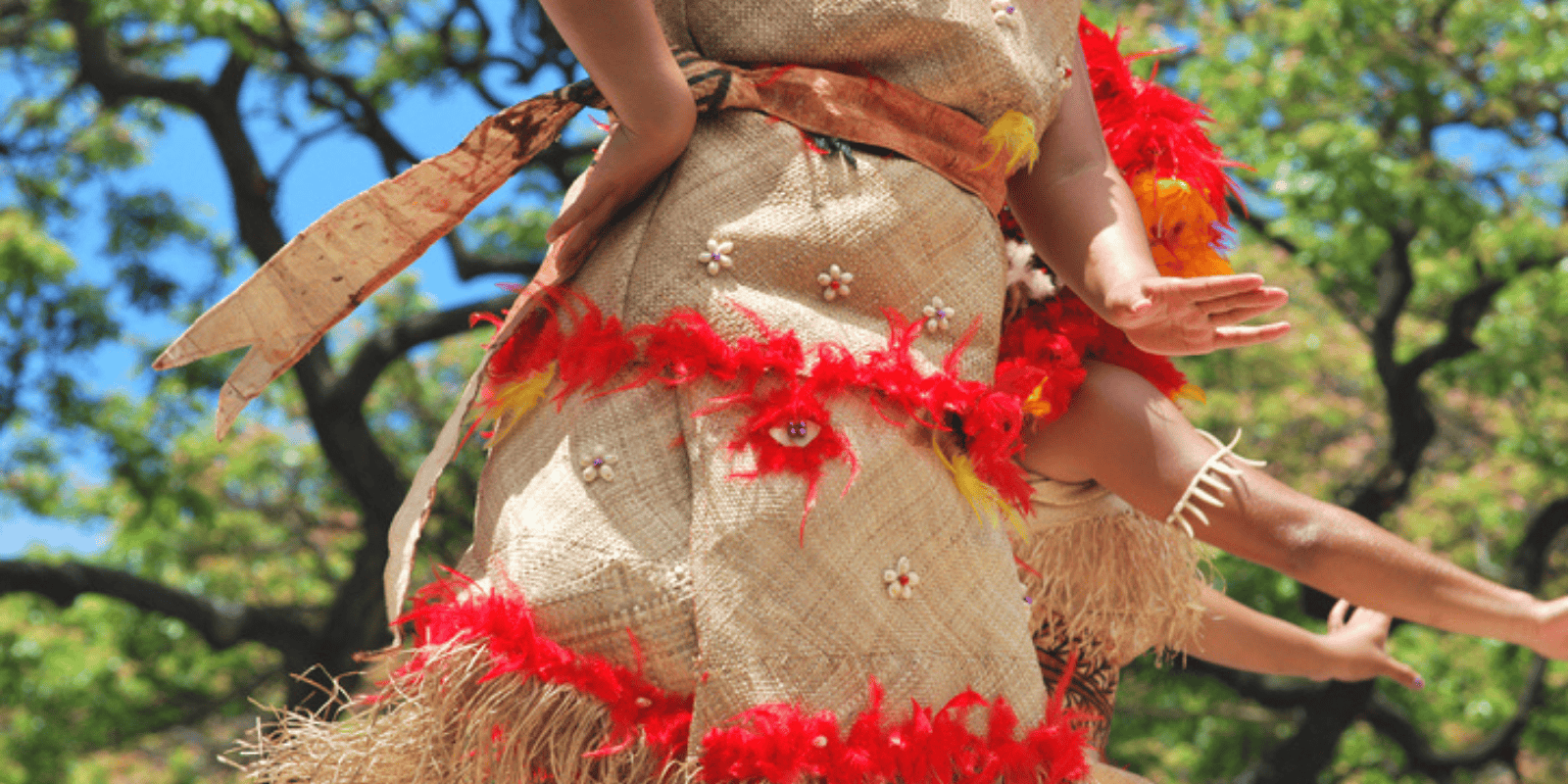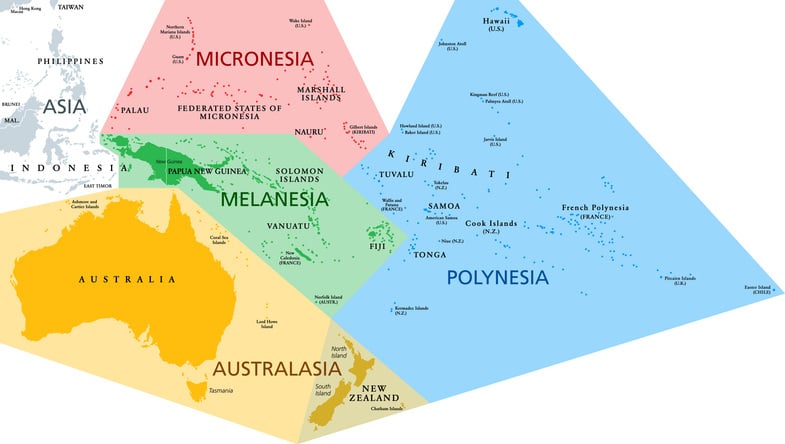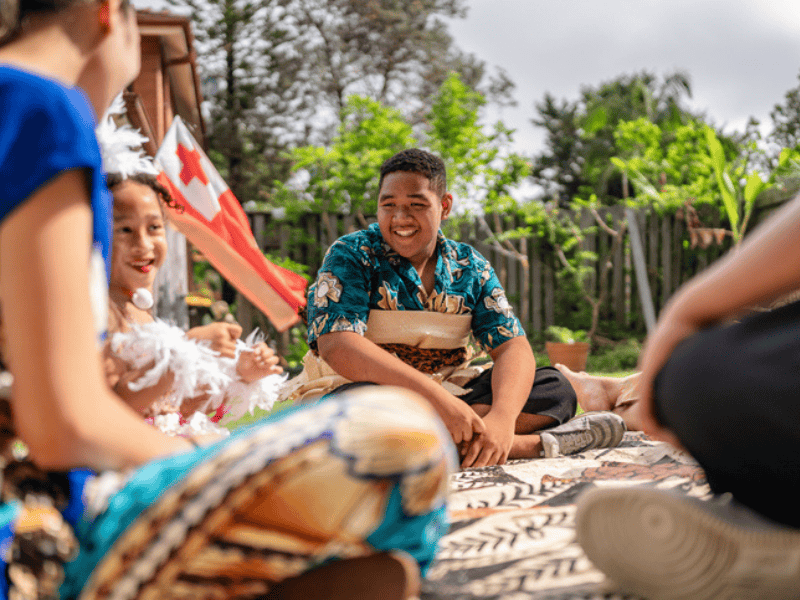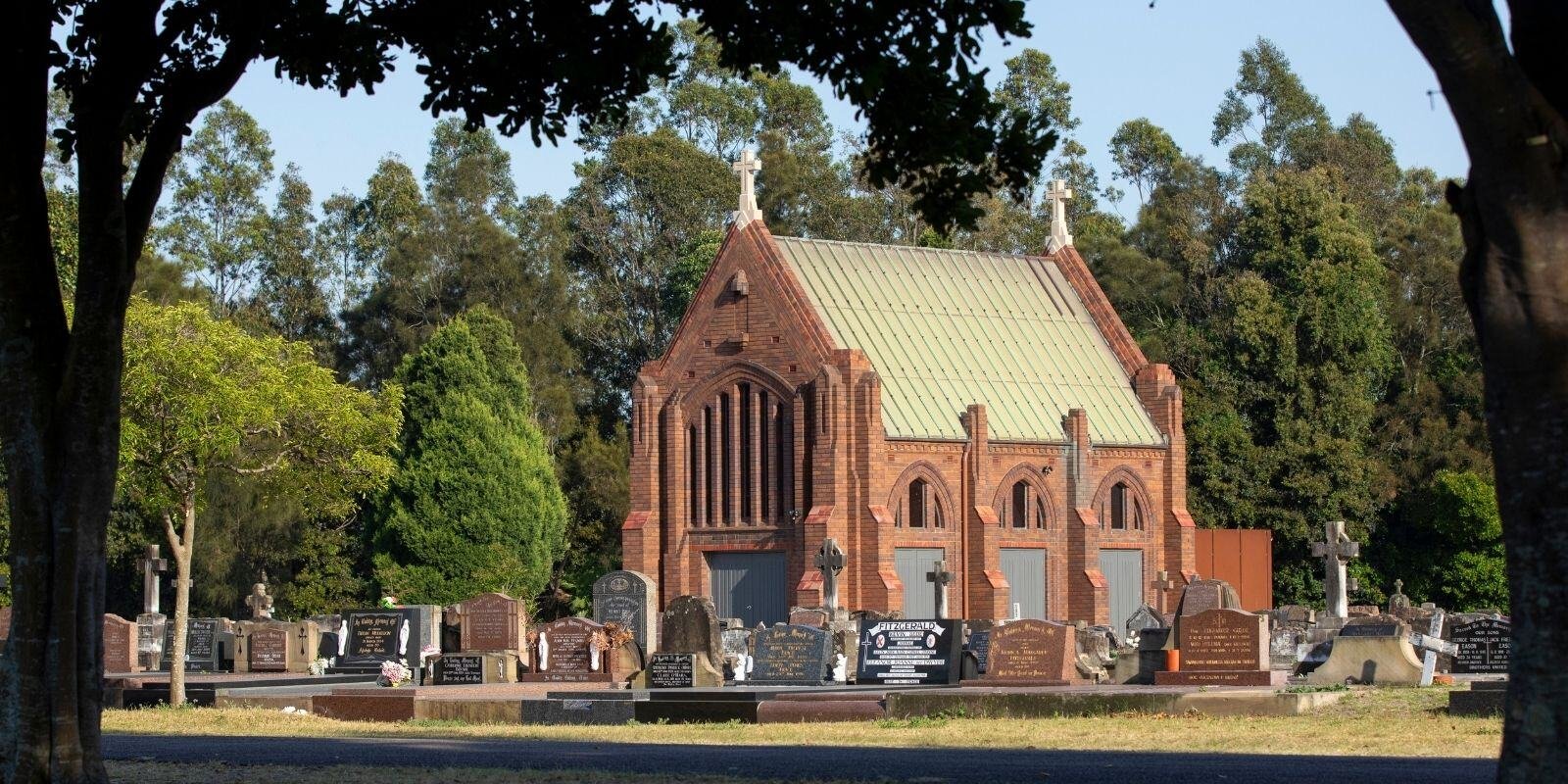
Pacifica cultural conversations
Metropolitan Memorial Parks
31 March 2025
Pacific Nations (Pasefika) are the peoples of the Pacific Islands, also known as Pacific Islanders. As a term of ethnicity, it is used to describe the original peoples of any of the three major subregions of Oceania (across the Central and South Pacific Oceans).
Pasefika was first used to describe Pacific Islanders as non-indigenous ethnic group(s) who had migrated and settled in New Zealand; When used in New Zealand (and Australia), Pasifika excludes the indigenous Maori people.

Cultural regions of the Pacific Islands
The cultures of the Pacific divide into three distinct groups:
- Melanesia – The most populous subregion, stretching from Papua New Guinea to Fiji.
- Micronesia – A collection of smaller islands north of Melanesia and Polynesia, Palau, Guam, Federated States of Micronesia, Kiribati, Marshall Islands, and Nauru.
- Polynesia – The largest geographical region, covering New Zealand, Hawaii, Easter Island (Rapanui), and Tuvalu.
The role of Christianity in Samoan, Fijian, and Tongan cultures
Christianity is embedded in Samoan, Fijian and Tongan culture and society. While Christianity is the dominant religion for Pasefika peoples elements of indigenous spirituality coexist with Christian practices.
Some maintain beliefs in ancestral spirits and traditional healing allowing for the integration of certain aspects of their cultural heritage with their Christian faith. This blend of traditions reflects the unique way Fijian, Samoan and Tongan society balances indigenous and modern religious practices with its indigenous roots.
- Attending church services is a central part of life for Pasefika people and with families participating in weekly Saturday or Sunday church services. The church plays a role in reinforcing family and community values.
- Religious leaders are respected figures in the community and churches have pastors or ministers who provide spiritual guidance, counselling, and pastoral care to their congregants.
- In all three nations traditional chiefs (known as Turaga in Fiji, Matai in Samoa, and Hou'eiki and Matapule in Tonga) hold political and spiritual significance. Chiefs lead ceremonies and their authority is seen as divinely sanctioned.
- Across all three cultures there is a profound respect for ancestors, often invoked in both traditional and Christian practices. Funerals are elaborate community affairs where both ancestral and Christian rituals play a role in guiding the soul of the deceased to the afterlife.

Pacifica expressions of grief
In Fijian, Tongan, and Samoan cultures, mourning is a deeply communal experience. Families and the broader community participate in elaborate rituals, which may include:
-
Public expressions of grief, such as wailing, singing, and chanting.
-
Caring for the deceased, including washing and preparing the body, which is often displayed in the family home.
-
Funeral customs that integrate Christian traditions with indigenous rituals, honouring both the spiritual and cultural heritage of the deceased.
End-of-life and funeral practices across the Pacific
Fiji
Fijian funerals incorporate both Christian and traditional elements, with rituals like masi (tapa cloth) draping, tagi (wailing), and the i-reguregu (offering of gifts), to support the grieving family and show reverence for the dead.
A significant portion of the Fijian population is Christian with various denominations such as Methodist, Catholic, and Seventh-day Adventist being prominent. Turaga is the chief or leader who holds authority within the traditional Fijian social structure. Their responsibilities include overseeing land and resources, ensuring social order, and guiding important cultural and ceremonial practices.
|
The Turaga are important spiritual figures who lead rituals and ceremonies, and act as intermediaries between the physical and spiritual worlds. They uphold Fijian customs and maintain the link between traditional beliefs and the modern nation which reinforces the importance of cultural preservation in Fijian life.
Indigenous Fijians, known as i-Taukei, have traditional beliefs and customs related to death. These beliefs may include ideas about the spirit or soul continuing its journey after death. |

Fijian man preparing a basket mad out of palm tree leaves full with meat for Lovo. Lovo (Fijian cooking food underground) is commonly made during events such as funerals. |
In some Fijian communities, there is a mourning period that can last several days or even weeks following a death. During this time family and friends come together to provide support to the grieving family. It is traditional to bury the deceased, although cremation is becoming more accepted among some Fijians.
Samoan
Samoan funerals blend Christianity and traditional customs with the exchange of items such as toga (fine mats) symbolising family responsibility and respect.
The chiefs and leaders of extended families, Matai, hold significant cultural and political authority. They lead the proceedings, ensuring ancestral and spiritual connections are maintained. There are two types of Matai: the Ali’i (high chiefs), who represent the leadership of the family, and the Tulafale (orator chiefs), who handle speechmaking and represent the family in public or formal settings. The Matai also performs essential duties during other important ceremonies such as weddings and traditional events.
Funerals are significant events in Samoan culture, often elaborate and lasting for several days. The body of the deceased is typically laid in the family home where family and community members come to pay their respects and hold vigils. Many Samoan funerals incorporate traditional cultural elements. This can include the use of “Ie Toga”, (fine mats of sizes up to several metres in length and width), siapo, tapa cloth of sizes up to several metres in length and width), and traditional chants or hymns in the Samoan language.
|
During the mourning period, family and friends gather, this is referred to as “fa’alavelave” where fa’a Samoa, is performed by elders, mainly “matai” who have come to pay their respects, through gifting of Ie Toga, food, money and eloquent oratory performed by the “Tulafale” (Orator Chief). These "fa'alavelave," are an essential part of Samoan funerals. They involve speeches, singing, dancing, and sharing stories about the deceased. |
.jpg?width=380&height=254&name=iStock-1177607499%20(1).jpg)
|
Tonga
Ta’ovala mats and kiekie funeral practices mix Christian and indigenous customs. Mourners wear black and wrap mats (ta’ovala,) around their waist. The type and size of the ta’ovala proclaim the mourner's relationship to the deceased. Immediate family members might also choose to wear a worn or frayed ta'ovala to show respect and love for their family that has passed on. Women often wear a rope-like skirt (kiekie) over their garments made from varied materials.

|
Each island group in Tonga has different materials fashioned out of the kiekie. It is a fundamental part of the culture making it easy to determine where someone is from.
Hou'eiki is the noble class or chiefs who have significant political, social, and spiritual authority. They are responsible for leading cultural and ceremonial life. As mediators between the people, the monarchy, and the church, Hou'eiki play a crucial role in preserving Tongan traditions and reinforcing the connection between governance and spirituality. |
Most Tongans are members of the Free Wesleyan Church of Tonga. Christian funeral services and customs are commonly observed. This includes church services, hymns, and prayers.
Burial is the more common than cremation and traditional Tongan graves are typically oriented east to west with the deceased's head facing east. This orientation is symbolic of the rising sun and the hope of resurrection. Prayers and hymns are held at the gravesite.
|
The deceased is often dressed in traditional Tongan clothing or white burial garments. Family members may also place personal items and mementos in the casket. Families may also choose to wrap the casket in a Fala (mat traditionally woven from pandanus leaves), a gesture to keep the deceased warm.
Family and friends may place offerings such as flowers, traditional tapa cloth, and food items in and around the grave, as a sign of respect and remembrance. |

|
The introduction of Christianity to the Pacific Islands
Christianity spread to the Pacific Islands, including Fiji, Tonga, and Samoa by European missionaries during the 18th and 19th centuries. The process was influenced by local leaders, colonial powers, and missionary societies, who worked to establish the religion across the pacific.
Christianity transformed Fiji, Tonga, and Samoa. Traditional practices, social hierarchies, and governance systems were reshaped by Christian values. Churches became central to community life and religious celebrations became important cultural events.
Christianity in FijiChristianity was introduced to Fiji in the early 19th century by Methodist missionaries from the London Missionary Society (LMS). The first missionaries arrived in 1835, led by David Cargill and William Cross. Conversion was slow at first but gained momentum when a powerful Fijian chief, Ratu Seru Cakobau, converted to Christianity in 1854. His conversion encouraged many Fijians to follow suit. The Methodist Church remains one of the largest Christian denominations in Fiji today. |

Image: Ratu Seru Cakobau |
Christianity in TongaChristianity was introduced in Tonga in 1797 by missionaries from the London Missionary Society. The first missionaries were part of a broader effort to evangelise the Pacific region.
A major figure in the spread of Christianity in Tonga was King George Tupou I, who converted to Christianity in 1831 and declared Tonga a Christian kingdom. His leadership helped establish the Free Wesleyan Church of Tonga, which remains the largest denomination in the country today. |
Image: King George Tupou I |
Christianity in Samoa
Samoa was first introduced to Christianity in the 1830s by missionaries from the London Missionary Society (LMS). John Williams, a prominent missionary, arrived in 1830 and played a key role in converting the Samoan people to Christianity.
Christianity spread rapidly in Samoa, supported by local chiefs, who embraced the new faith and helped integrate it into Samoan society. By the mid-19th century, Samoa was predominantly Christian. The Congregational Christian Church of Samoa (CCCS), established by the LMS, is the largest Christian denomination in Samoa today.
Pacific Islander memorialisation at Metropolitan Memorial Parks
At Metropolitan Memorial Parks, we proudly provide memorial and funeral services that honour the rich cultural and religious traditions of Pacific Islanders at Rookwood. Our services are designed to respect the unique customs and values of our diverse communities.
To learn more about our memorialisation and funeral services at Rookwood's dedicated Māori lawn, contact us today. This sacred space reflects the values of the Māori community and incorporates traditional Islander customs into our interment services.







-1.jpg?width=1600&name=Banner%20(7)-1.jpg)







.jpg?width=1600&name=RGC%20Gallery%20(3).jpg)




.jpg?width=2000&name=Copy%20of%20MMP%20Website%20Header%20Image%20Template%20(1).jpg)
.jpg?width=1600&name=WMP%20Wonderfully%20Made%20Memorial%20(1).jpg)

.jpg?width=2000&name=Copy%20of%20MMP%20Website%20Header%20Image%20Template%20(2).jpg)

.jpg?width=800&name=Untitled%20design%20(56).jpg)













